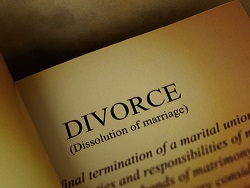
NJ.com reports that Pamela Anderson has filed for divorce from poker pro husband Rick Salomon. This is the second marriage, and second dissolution, between Anderson and Salomon. The couple was married in 2007 and, after two months, obtained an annulment based on fraud in 2008. Why would Anderson file for an annulment in 2008, but choose to file for a divorce this time around? The answer could be in the legal requirements and remedies involved in each type of marriage dissolution. Although California law governed the Anderson/Salomon annulment and will govern the couple’s divorce, let’s look at the differences between divorce and annulment in New Jersey.
The major difference between a New Jersey divorce and an annulment is the effect each one has on the marriage. A divorce ends a valid marriage, and carries with it certain rights a person has in a divorce. An annulment nullifies a void or voidable marriage, so it is as if the marriage never existed. Because of this, when a couple gets an annulment, they are not entitled to certain rights a person has in a divorce, such as equitable distribution and support.
N.J.S.A. 2A:34-1 governs when an annulment can be granted in New Jersey. In order to obtain an annulment, the party seeking the annulment must prove one of the limited situations that warrants an annulment. Those circumstances are age, incapacity, polygamy, impotence, incest, fraud, or duress.
A New Jersey divorce requires the party seeking the dissolution to plead a cause of action for divorce, which are listed in N.J.S.A. 2A:34-2. With a divorce, you have the option of choosing a no fault or fault based cause of action. The fault based causes of action include adultery, desertion, extreme cruelty, substance abuse, institutionalization, imprisonment, and deviant sexual conduct. These causes of action, similar to annulment, require the party to prove each element of the cause of action, proving the other spouse was at fault.
Alternatively, the two no fault causes of action, irreconcilable differences and separation, do not require quite so much. Irreconcilable differences simply requires the person seeking the divorce to prove that there have been irreconcilable differences for six months that led to the breakdown of the marriage, and separation requires that he or she prove that they have lived separate and apart for 18 months. Therefore, the no fault causes of action are much easier to prove than the fault based causes of action for divorce and the grounds for annulment, although they do require that you were married for a certain period of time.
In the end, the option you choose to end your marriage depends on the type of marriage that you have, whether it is void or voidable, how long you have been married, and whether you wish to be entitled to property division and spousal support, among other considerations.
If you are considering ending your marriage and have questions about the differences between an annulment and a New Jersey divorce, or between a fault-based and no fault divorce, or you simply would like assistance in starting the dissolution process, please contact the experienced New Jersey divorce lawyers at Sarno da Costa D’Aniello Maceri LLC at 973-274-5200.


